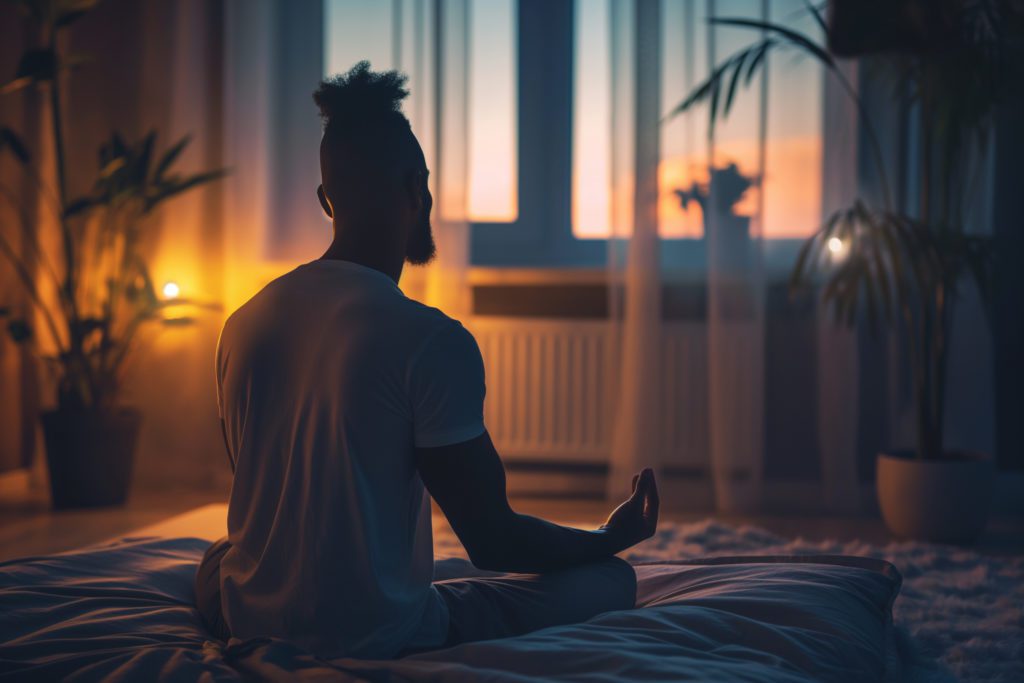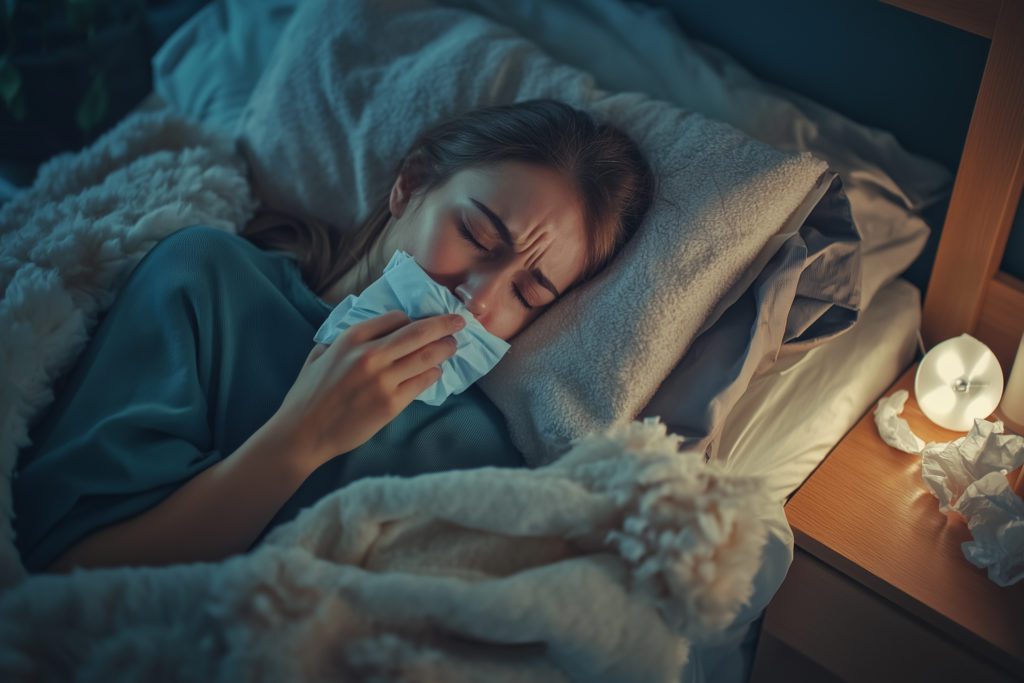
Techniques for Preventing Confusional Arousals and Sleep-Related Confusion
Waking up during deep sleep can cause confusional arousals and sleep drunkenness. Explore what causes confusional arousal and how to prevent it.

Have you ever been told that you woke up during the night, acted really confused, then went back to sleep, despite you having no recollection of it? This confusional arousal, which may also be referred to as sleep drunkenness, is a type of arousal parasomnia, which is when you have wakeful behaviors while appearing asleep.
If someone has confusional arousal, they wake up, or at least look like they wake up, but then act disoriented and confused. In most cases, this is caused by sleep deprivation, so ensuring you get enough sleep—whether by improving your sleep hygiene or treating a sleep disorder—can go a long way in preventing sleep-related confusion.
What is a Confusional Arousal?
During a confusional arousal event, a person may talk in their sleep or have their eyes open, but they likely won’t remember the event after it happens. In most cases, the episodes last for a few minutes, but in some cases, they may last up to half an hour.
Unlike other arousal disorders, those who have confusional arousal remain in bed and do not have a high heart rate or any other signs of terror.
As for how common confusional arousals can be, the data varies. Some studies have reported that up to 15.2% of adults experience confusional arousals, while other studies have a much lower percentage of 4.2%. Furthermore, confusional arousals are more common in children, with the American Academy of Sleep Medicine stating that only 3%-4% of adults over 15 but 17% of children experience it. In many cases, children who experience confusional arousals will grow up as older children or adults who sleepwalk.
Those who have a confusional arousal may exhibit the following symptoms:
- Arousing suddenly but not being fully awake
- Glassy stare
- Looking disoriented and confused
- Mumbling, incoherent speech, or vocalizations
- Lack of or inappropriate response to people nearby
- No memory of the events that occur
If you experience frequent arousals, they can cause sleep deprivation and excessive daytime sleepiness.
Sleep Drunkenness: A Component of Confusional Arousal
Sleep drunkenness, a prolonged period of sleep inertia, is the groggy transitional state of waking up where you struggle to wake up fully and continually fall back asleep. During this time, you may also display irritability and confusion.
Those with confusional arousal may exhibit sleep drunkenness because the sleep-wake disorder causes them to wake up only partially.
Causes of Confusional Arousal
To best prevent confusional arousal, it is first important to know what may cause it.
Confusional arousals take place during non-rapid eye movement (NREM) sleep, which occurs during the first few sleep stages. This is because NREM sleep is when you transition from light to deeper sleep, and confusional arousals generally happen when someone is interrupted during deep sleep.
Researchers speculate that confusional arousals occur when different areas of the brain do not communicate with each other—some stay asleep while others wake up.
As for what may rouse you from deep sleep, some possible conditions include:
- Narcolepsy
- Obstructive sleep apnea
- Circadian rhythm sleep disorders
- Periodic limb movement disorder
- Bipolar disorder
- Panic disorder
These are all sleep disorders that can cause nighttime wakings. If these wakings occur during deep sleep, a confusional arousal may occur.
Additionally, any outside triggering event, such as a phone ringing while you’re sleeping, a bright light, or needing to go to the bathroom, can also cause you to wake during deep sleep, triggering confusional arousal.
Tips for Preventing Confusional Arousals
In general, preventing confusional arousal and sleep drunkenness involves improving your sleep time and quality.
There are a few ways that you can do this:
Improve Your Sleep Hygiene
Sleep hygiene refers to the habits that promote a good night’s sleep. When you improve your sleep hygiene, you’ll be able to fall asleep easier and stay asleep longer, which can help keep you from waking during the deep sleep NREM stages, thus preventing confusional arousals.
Some ways that you can improve your sleep hygiene include:
- Create a relaxing bedtime routine. Try including habits like listening to soothing music, meditating, journaling, or reading.
- Keep a regular sleep schedule (even on weekends). This helps regulate your circadian rhythm, ensuring that your body is ready for sleep when you lie down in bed.
- Avoid caffeine in the afternoon and evening. If you’re tired during the day, caffeine may feel necessary, but make sure you cut yourself off before it gets too late, or you may have more sleep deprivation in your future.
- Exercise regularly and during the day. Bonus points if you exercise outside in the sunlight to further regulate your circadian rhythm and boost your energy.
- Nap before 3. Napping too late in the day can mess with your sleep at night, so keep your naps to before 3, which aligns with when your circadian rhythm naturally dips.
Avoid Sleep Deprivation
If you regularly experience confusional arousals, be sure to avoid any known triggers and situations that cause you sleep deprivation—for example, staying up to watch the midnight premiere of a movie. It may seem exciting, but the sleep deprivation that results can increase your likelihood of a confusional arousal.
Have Your Sleep Disorder Treated
If your confusional arousals are caused by a sleep disorder that causes nighttime wakings or poor sleep quality, treating the sleep disorder will lessen your risk of confusional arousals while also improving your overall well-being.
Destress
A risk factor for confusional arousal is excessive stress and worry, which can not only make it hard to fall asleep but also increase your likelihood of waking during the night. To combat this, work on lowering your stress levels during the day—exercising is a great way to sweat it out, journaling can help you work through your thoughts, and dumping out a to-do list for the next day before bed can help keep you from mentally keeping track of everything.
Most importantly, find healthy ways to cope with the stress. Alcohol, for instance, may help to dim your stress, but drinking it too close to bed can mess with your sleep and also increase your risk of confusional arousal, leaving you no better off.
Waking Up Shouldn’t Be Confusing
Waking up unsure of what is going on is just one component of confusional arousals, which can leave those affected unsure of who is around or what is happening. While it doesn’t cause the terror seen in other parasomnias, it can still be disorienting and affect your sleep quality. If it continues, it may even cause sleep deprivation.
To prevent confusional arousals and other causes of sleep-related confusion, be sure to prioritize your sleep hygiene, limit triggers that cause sleep deprivation, have sleep disorders treated, and destress. By practicing these habits, you can sleep better during the night and will be less likely to wake up confused.
FAQ
Can medications cause or worsen confusional arousals?
Yes, certain medications, including sedatives, antidepressants, and antihistamines, can contribute to confusional arousals by altering sleep patterns. These drugs may increase deep sleep, where confusional arousals are more likely to occur, or cause sleep fragmentation, making awakenings more frequent and disorienting.
Do wearable sleep trackers help in identifying confusional arousals?
Wearable sleep trackers monitor movement, heart rate, and sleep cycles, but they may not precisely detect confusional arousals, as these episodes involve cognitive confusion rather than significant physical activity. A sleep study (polysomnography) is the most accurate way to diagnose confusional arousals by analyzing brain activity and sleep stage transitions.
Is there a genetic predisposition to confusional arousals?
Yes, confusional arousals often run in families, suggesting a genetic component. Studies show that individuals with a family history of parasomnias, such as sleepwalking or night terrors, are more likely to experience confusional arousals. While genetics play a role, environmental factors like stress and sleep deprivation can also trigger episodes.
How is confusional arousal diagnosed?
Confusional arousals are diagnosed based on medical history, symptom descriptions, and, if needed, sleep studies. A doctor may ask about sleep habits, triggers, and family history. In cases where other sleep disorders are suspected, polysomnography can provide detailed insights into brain activity, helping distinguish confusional arousals from conditions like sleep apnea.
Are children more susceptible to confusional arousals than adults?
Yes, children experience confusional arousals more frequently than adults, with episodes peaking between ages 3 and 13. The high occurrence in children is linked to increased deep sleep, which decreases with age. Most children outgrow these episodes as their sleep patterns mature, but occasional occurrences in adulthood can still happen.
What should a bed partner do during a confusional arousal episode?
The best approach is to remain calm and avoid startling the person. Trying to forcefully wake them may increase disorientation or agitation. Instead, gently guide them back to sleep if necessary, ensuring their environment is safe from hazards. In most cases, the episode will resolve on its own within minutes without intervention.

Written by
Jessica G
Medical writer freelancer who has written hundreds of articles on varying topics. Masters of Engineering degree in Biomedical Engineering.
Download Pillow
Get help
Press & News
Legal
Connect
X (Twitter)
Company
Copyright © Neybox Digital Ltd.



